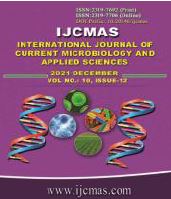


 National Academy of Agricultural Sciences (NAAS)
National Academy of Agricultural Sciences (NAAS)

|
PRINT ISSN : 2319-7692
Online ISSN : 2319-7706 Issues : 12 per year Publisher : Excellent Publishers Email : editorijcmas@gmail.com / submit@ijcmas.com Editor-in-chief: Dr.M.Prakash Index Copernicus ICV 2018: 95.39 NAAS RATING 2020: 5.38 |
Tomato is an important plant grown in tropics as a perennial plant and in other areas mostly as annual plant. Tomato plant grows upto an height of 9 feet. The flowers are small, yellow and have five lobes on corolla. The fruit colour is green when unripe and red when it is fully ripe. Fruit is low in calorie and rich in vitamins and minerals. Genetic variability, heritability and genetic advance were assessed in thirty five genotypes of tomato at Departmental Research Farm of Vegetable Science, UHF, Solan, HP during kharif season, 2016. The experiment was laid out in RCBD with three replications. Analysis of variance revealed highly significant differences among genotypes for all the characters under study. The PCV (Phenotypic coefficient of variation) and GCV (Genotypic coefficient of variation) were higher for fruits per cluster (49.66 % and 49.50 %), fruits per plant (46.28 % and 46.11 %), yield per plant (38.13 % and 38.04 %) and average fruit weight (30.39 % and 30.29 %). High GCV and PCV provide the possibility of improving and fixing the characters through selection breeding. High heritability along with high estimates of genetic gain were observed for number of fruits per cluster (99.33 % and 101.63 %), number of fruits per plant (99.28 % and 94.66 %), fruit yield per plant (99.52 % and 78.18 %) and average fruit weight (99.35% and 62.19 %). High heritability and genetic gain suggest the possibility of improvement of traits by means of selection due to existence of additive gene effect. Selection for these above characters will be fruitful in improving fruit yield in tomato.
 |
 |
 |
 |
 |